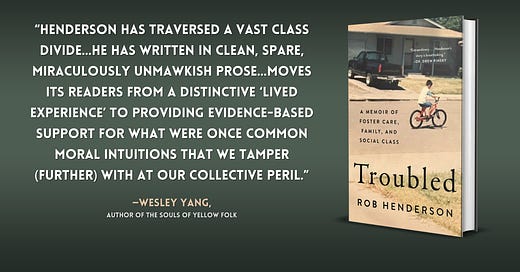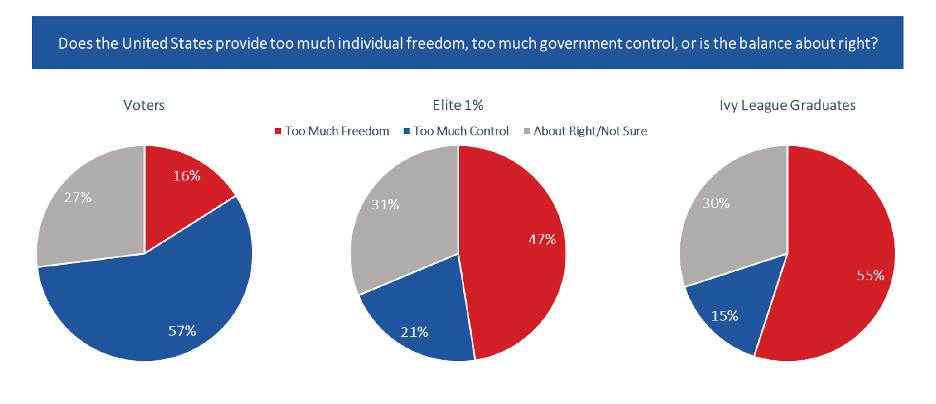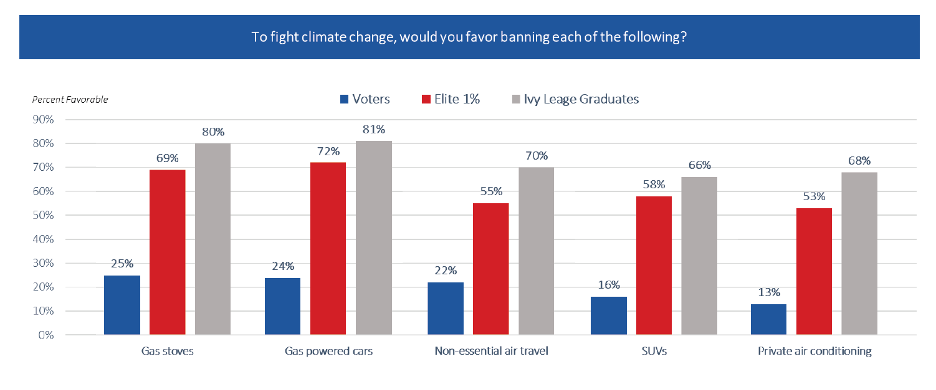The Grand Canyon-Sized Chasm Between Elites and Ordinary Americans
Ivy Leaguers versus everyone else
55% of Ivy League graduates believe that the U.S. “provides too much individual freedom” compared with just 16% of ordinary U.S. voters.
Back in 2019, as I was developing what became the luxury beliefs framework, I read a recently issued chapter published by Cambridge University Press titled “Why Are Elites More Cosmopolitan than Masses?”
Authored by a team of social scientists, this 2019 paper reports stunning gaps in political views and outlooks between elites and ordinary people in various western countries.
In the introduction, they suggest that elite attitudes are expressions of cultural capital. That is, the large gap in views between elites and everyone results from elites drawing symbolic boundaries between themselves and the provincial masses.
Indeed, another report found that 65 percent of Americans believed that the most educated and successful people in America are more interested in serving themselves than in serving the common good. This view is held across the board—across age, gender, race, political party, and ideology.
The authors of the 2019 chapter write:
“Mastering intricacies of gender and race relations discourse and behavior has become a marker for belonging to the cosmopolitan class, in a similar way that tastes for classical music and art were markers of bourgeois culture in the 19th and 20th centuries.”
Interestingly, the researchers find that social background and ideological affinities account for elite similarities more so than educational attainment. This might be one reason why, despite obtaining the same degrees from the same institutions as many elites, I still retain an outlook reflective of my provincial upbringing.
Following my experiences in the Los Angeles county foster system, my adoptive family and I settled in a dusty lower-class town in the northernmost region of California—a place just as provincial as any rundown neighborhood in flyover country—where I spent most of my youth.
The authors of the paper measured the opinions of elites (those holding the highest positions in each sector) across various fields including politics, finance, academia, and media, as well as the opinions of ordinary people.
Relative to the masses, elites are more likely to agree with statements such as “We should do everything possible to fight climate change, even if it slows economic growth.”
And elites are more in favor of allocating authority not to local or national governments, but to global organizational bodies (e.g., the U.N.).
The researchers also found that elites are significantly more pro-immigration, as measured by the extent to which they agreed with statements like “When jobs are scarce, employers should give priority to people of [this country.]”
I thought about those results for a long time. Especially as I came across another study indicating that educated people are more likely to express prejudice toward immigrants who are described as highly educated, relative to less educated, and are therefore seen as job competitors.
Among university students, attitudes toward immigrants were most negative when the immigrants had a university education, and most positive when the immigrants had little to no formal education. It’s nice for the educated class when immigrants provide cheap hired help and open interesting restaurants. They’re less excited when immigrants are competing with them for the same jobs. If thousands of people with bachelor’s and postgraduate degrees from, say, China and India, were unlawfully entering the U.S. each day, my guess is current elite attitudes around border security would be very different.
A new 2024 survey by Rasmussen’s RMG research has found additional evidence that U.S. elites really are different from ordinary Americans (Thanks to Dovid Schwartz for putting this on my radar).
In this new 2024 survey, elites are defined as individuals with postgraduate degrees who earn more than $150,000 a year and live in metropolitan areas. This segment of society amounts to about 1% of the U.S. population. Under this definition, I’d be a member. Then I think about that Groucho Marx quote about how I wouldn’t want to belong to a club that would—well, you know. As I mentioned, my views were shaped by my upbringing more so than my education. Most people are this way, which is why researchers typically use an individual’s parental education to measure the person’s social class. A high school dropout with two college-educated parents will tend to share their parents’ outlook and mirror the mannerisms reflective of their class. A PhD with two non-college educated parents will tend to share their parents’ outlook and mirror the mannerisms reflective of their class.
Anyway, this new survey gathered responses from these elites and compared their views to everyone else. Interestingly, the survey also separately reports results from elites with degrees from what are sometimes called “Ivy plus” schools (which encompass the Ivy League and other similar expensive institutions including Duke, Stanford, Northwestern, and the University of Chicago). Roughly half of the elites in the survey attended one of these schools. As you’ll see, the elites who graduated from such institutions hold views that are even more far removed than other elites from the views of ordinary Americans.
Perhaps the most striking divergence between elite and non-elite opinion: Although the majority of ordinary voters oppose the strict rationing of meat, electricity, and gas to fight climate change, 89% of Ivy graduates and 77% of elites overall are in favor of it.
As I point out in my debut book, luxury beliefs are ideas and opinions that confer status on the upper class, while often inflicting costs on the lower classes.
If meat, electricity, and gas were strictly rationed, it is a certainty that Ivy graduates and other elites would find a workaround and remain unaffected.
Elite opinion also differs from non-elites on what used to be considered a foundational American principle: 55% of Ivy plus graduates and 47% of elites believe the U.S. “provides too much individual freedom” compared with just 16% of ordinary Americans.
The gap—what the report describes as a “Grand Canyon-sized chasm”—between elites and non-elites exists regardless of whether the elites self-identify as Democrats or Republicans.
Seventy-three percent of elites identified as Democrats and 14% as Republicans. The report states that, “The Elite class – regardless of party – is an exclusive club that sees and experiences America through a different lens than ordinary Americans.”
Other interesting findings:
Among the elite, the vast majority (74%) say their finances are improving, compared with just 20% of ordinary voters. The share is 88% among Ivy plus graduates.
Elites have a far more favorable view of journalists (79%) than non-elites (44%).
91% of Ivy graduates, 78% of elites overall, and just 49% of ordinary voters have a favorable view of lawyers.
86% of Ivy graduates, 67% of elites, and only 28% of non-elites have a favorable view of members of congress.
Among the elite, President Biden has an 84% approval rating, roughly twice as high as among the general public.
70% of Ivy grads, 55% of elites, and just 22% of non-elites are in favor of banning non-essential air travel “to fight climate change.”
The majority of Ivy graduates and elites are also in favor of banning private air conditioning, gas powered cars, gas stoves, and SUVs “to fight climate change.”
Finally, the vast majority of elites say they’d prefer a political candidate who said teachers and educational professionals, rather than parents, should decide what children are taught.
Again, the elites encompass only about 1% of the population, but they are prominent in every U.S. institution, from Wall Street to academia to tech to media.
Most grow up in the same parts of the country, attend similar schools, study at the same colleges, work in the same occupations, live in the same metropolitan areas, travel to the same conferences, and consume the same media.
To be clear, there’s no conspiracy. Power laws dominate when people can move freely within an interconnected complex system. And the more interconnected and freer the system, the more pronounced the power law. Economies, supply chains, trade, education, media, and markets have become more intertwined and global. Centuries ago, when the U.S. was a scattered collection of states, things were very different.
Ironically, this relatively interconnected and free system that now exists has given rise to a situation where power is accruing into the hands of people who are skeptical of freedom. Power itself seems to obey a power law, accruing into the hands of fewer and fewer people. However, powerful people’s attitudes about that power is not set in stone. Naturally, the people who have lots of power will want to exert it, usually with the best of intentions. But the outcomes of our actions don’t always reflect what we believe to be the goodness of our hearts.
The Rasmussen report concludes by stating, “given the influence they yield, the overall views of the Elites represent an existential threat to America’s founding ideals of freedom, equality, and self-governance.”
I’m reminded of another survey conducted in 2021 which found that Americans with a bachelor’s or postgraduate degree said that “closing the gap between rich and poor” is a more important goal than “ensuring Americans don't live in poverty.” In contrast, Americans whose highest educational attainment was a high school diploma said “ensuring Americans don't live in poverty” is a more important goal than “closing the gap between rich and poor.” Elites want to take their wealthier elite rivals down a peg. Meanwhile, ordinary Americans just want to not be poor.
You can read much more about elites and how they differ from ordinary Americans in my forthcoming book, out on February 20.
It’s out in about two weeks, but as an author, pre-orders can make or break a book. Preorders are how the booksellers, reviewers, and publishers judge interest in a title. If you’re sure you want to get it, please don’t wait! Thank you.
Audible (I narrated the audiobook myself)







“It’s nice for the educated class when immigrants provide cheap hired help and open interesting restaurants.” Hahaha
Henderson's essay is worth reading and re-reading. So much of what we observe in politics and culture today reflects this chasm.